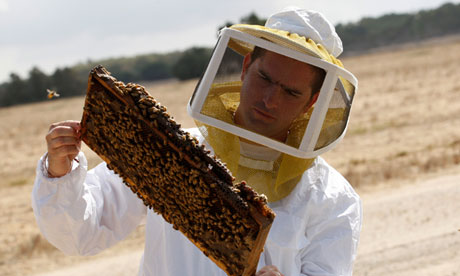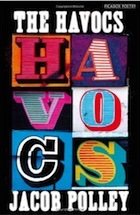Ben Wilkinson explores a poet committed to his nightmares

'Something of substance' … a beekeeper.
Photograph: Gil Cohen Magen/Reuters/Corbis
"Who says havoc is a vice of the young?" asks the speaker in the title poem
of Jacob Polley's third collection, The Havocs, which has been
shortlisted for this month's TS Eliot prize. You'd be hard pushed to level the
accusation at Polley, whose commitment to the nightmarish, creepy and unstable
has intensified with each of his books, and tends to feed his best poems.
 The Havocs
presents itself as a rangier book than its predecessors. Tripping through
assorted rhythms, sonnets, end-rhymed quatrains and the looping lines of its
centrepiece, it is as formally vibrant as the luminous letters that adorn its
cover. A few poems even find Polley cracking jokes: in an attempt to define
"havoc" by taking cues from Les
Murray's "The Quality of Sprawl", the title poem frames our societal
anxieties with a warped sense of humour. "As if I was a pencil and havoc
sharpened me," scoffs its speaker, "havoc is committed to care for the elderly,
education for all, and narrowing the gap between rich and fabulously rich."
The Havocs
presents itself as a rangier book than its predecessors. Tripping through
assorted rhythms, sonnets, end-rhymed quatrains and the looping lines of its
centrepiece, it is as formally vibrant as the luminous letters that adorn its
cover. A few poems even find Polley cracking jokes: in an attempt to define
"havoc" by taking cues from Les
Murray's "The Quality of Sprawl", the title poem frames our societal
anxieties with a warped sense of humour. "As if I was a pencil and havoc
sharpened me," scoffs its speaker, "havoc is committed to care for the elderly,
education for all, and narrowing the gap between rich and fabulously rich."
Polley's first collection,
The
Brink (2003), published while he was still in his 20s, was notable for
a pared-back diction and descriptive flair. Its colloquial patter in poems of
postmodern pastoral, father figures and secular spiritualism saw Polley combine
the influence of Seamus
Heaney, Ted Hughes and Simon Armitage in approaching his own vision. But the
book also zoned in on nature's chaos and human malevolence. Here was a crow
conjured from the biblical tale of Cain's murder of Abel, or the "floating
knuckle" of honeycomb in a jar, "attesting to the nature of the struggle". A
second volume, Little
Gods (2006), gave this supple lyricism a more formal grounding. Melding
an intense music with the transformative power of metaphor, its incantatory
poems delved deeper into death, despair, disappearance and dismal weather, with
Baudelaire as their presiding spirit.
 The Havocs
presents itself as a rangier book than its predecessors. Tripping through
assorted rhythms, sonnets, end-rhymed quatrains and the looping lines of its
centrepiece, it is as formally vibrant as the luminous letters that adorn its
cover. A few poems even find Polley cracking jokes: in an attempt to define
"havoc" by taking cues from Les
Murray's "The Quality of Sprawl", the title poem frames our societal
anxieties with a warped sense of humour. "As if I was a pencil and havoc
sharpened me," scoffs its speaker, "havoc is committed to care for the elderly,
education for all, and narrowing the gap between rich and fabulously rich."
The Havocs
presents itself as a rangier book than its predecessors. Tripping through
assorted rhythms, sonnets, end-rhymed quatrains and the looping lines of its
centrepiece, it is as formally vibrant as the luminous letters that adorn its
cover. A few poems even find Polley cracking jokes: in an attempt to define
"havoc" by taking cues from Les
Murray's "The Quality of Sprawl", the title poem frames our societal
anxieties with a warped sense of humour. "As if I was a pencil and havoc
sharpened me," scoffs its speaker, "havoc is committed to care for the elderly,
education for all, and narrowing the gap between rich and fabulously rich."
No comments:
Post a Comment